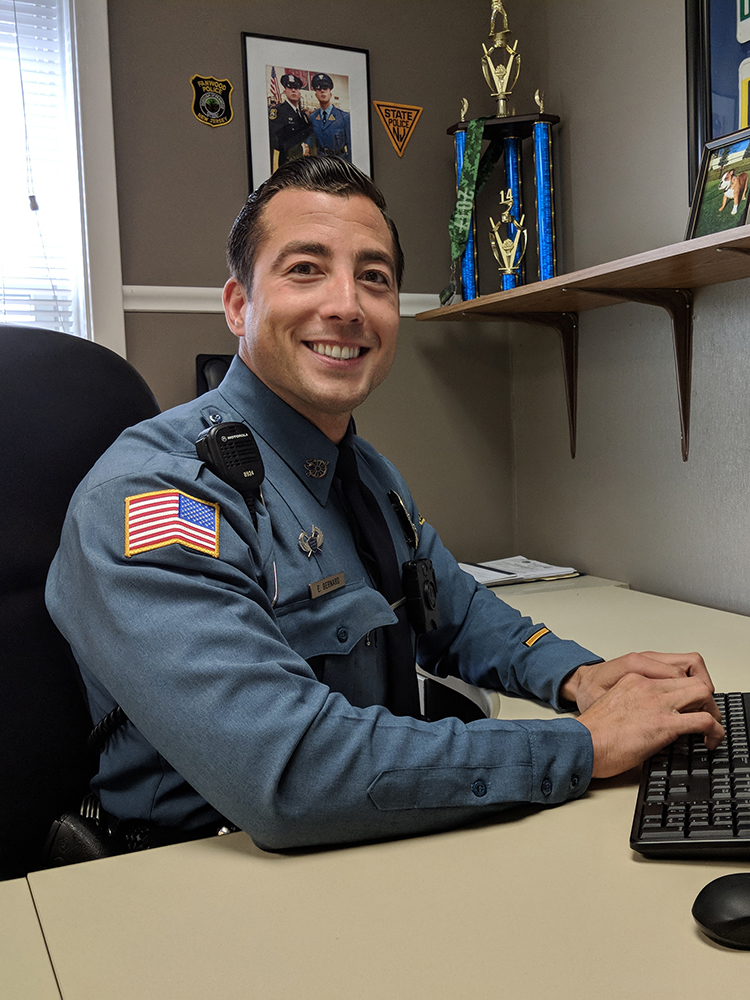(Fanwood, NJ)– Like many other visitors to post-hurricane Puerto Rico, Fanwood Police Officer Elliott Bernard says the images you see on TV and online simply don’t capture the enormity of the damage, even two months after the storm. Roads with giant fissures, downed utility poles, epic food and water shortages and the lack of power make day to day life exhausting.
“Every day, you have to secure water, fuel for your generators. You have to get food. It’s a daily thing,” he recalled from his desk at the Fanwood Police Department where he’s been a patrolman since 2009.
Bernard, a member of the Union County Emergency Response Team (UCERT), was among five law enforcement officers from the County to be selected for Operation New Jersey Pride, a statewide effort organized by the New Jersey State Police to help keep law and order in Puerto Rico in the wake of Hurricane Maria. He was there from October 21st to November 4th with a group totaling 100 law enforcement officers, all of whose salaries were paid by the federal government.
“We flew into San Juan and the airport looked like a ghost town,” he said. “No one else was getting off planes, getting baggage.”
After their first assigned hotel in the town of Dorado was found to have black mold everywhere, Bernard and 21 others were bussed to the Hilton in San Juan. It had a generator and running water.
“They had huge fans on,” he said. “You smelled the dampness. Walls were being knocked down because of mold.”
The Hilton would be his home away from home for 14 days, rooming with another police officer and being part of a four-man team who would be out assisting the Puerto Rican State Police in Caguas, a city about 25 miles southwest of San Juan, a city that took a direct hit from Maria.
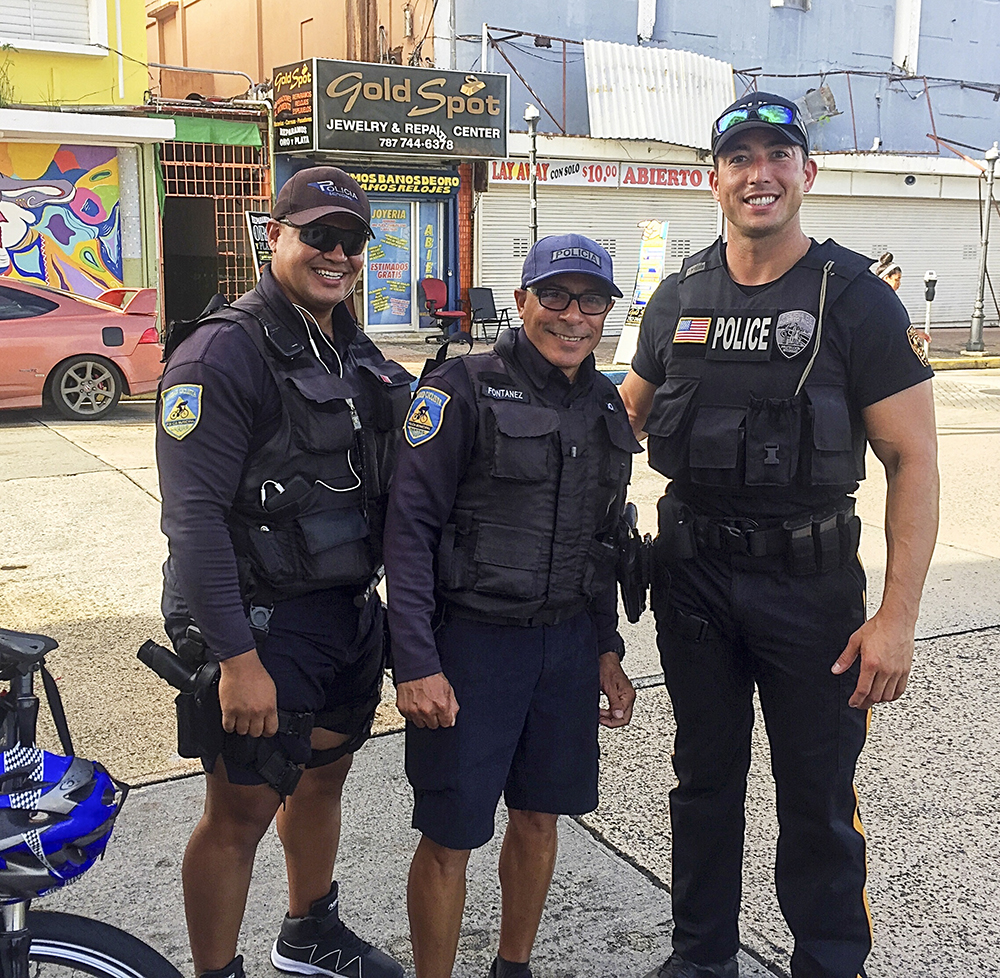
Officer Bernard, right, with two Caguas police officers
“These officers from Caguas were working 12 hours a day since before the hurricane. Most of them didn’t have uniforms. They were wearing their regular clothes. They didn’t have power, so they couldn’t wash their uniforms. They wore various every-day shirts and their gun belts. They had no radios. They communicated by waving each other down or cellphones.”
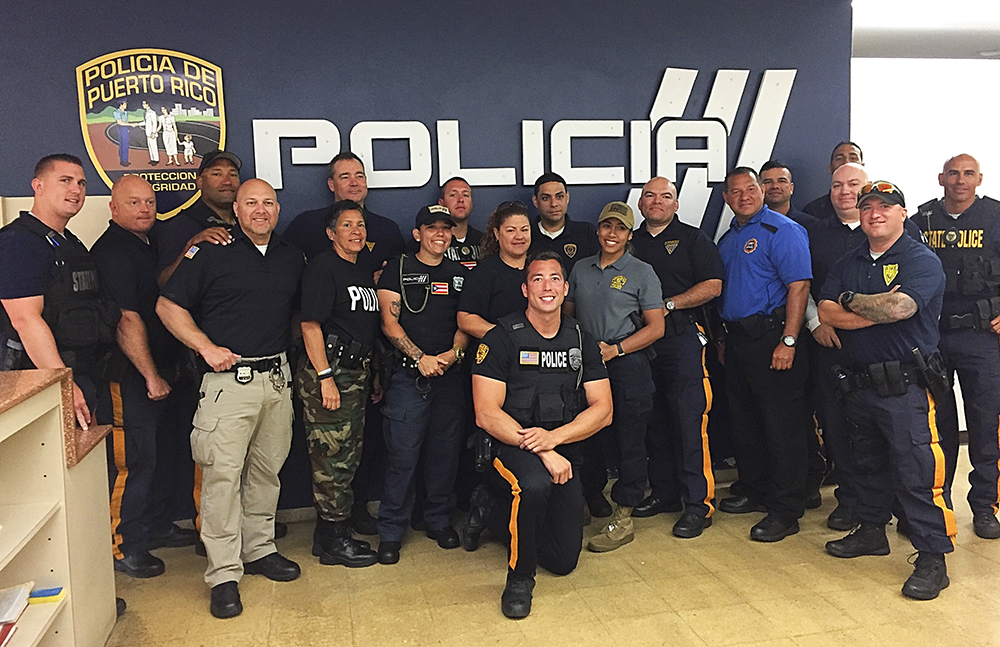
Off. Bernard, kneeling in front, with his team in Caguas
Bernard’s group of 22 officers was divided into five patrol teams of four plus two supervisors. Each team was given a marked New Jersey State Police car (26 were shipped to the island and will remain there as a donation) and one satellite phone.
“The phone worked 90% of the time. But one day for like 6 hours, there was no communication, even satellite phones. I don’t know what happened, but we were dealing with a shoplifting incident and we couldn’t get in touch with anyone else.” That incident ended peacefully without an arrest, but crime and violence is a dangerous byproduct of the hurricane aftermath.
“There were several reports of people getting their generator, getting their food and water, then walking out to their car and getting robbed by gang members and people who were desperate,” said Bernard, whose team spent time providing security at food and water distribution points, each of which had its own story of misery.
“We were out and about in parking lots, in the lines, watching people. Some supermarkets with generators were open but there were limited amounts of everything. There were lines three football fields long. You were only allowed one bag of ice, one case of water. So they’re waiting in line, it’s 90 degrees outside, back home there’s no power. People were extremely frustrated. Bigger stores like Home Depot would get, like, 25 generators at a time every couple days. So people would line up at 4 o’clock in the afternoon the day before for the next morning. Before we arrived, the police in Caguas were trying to do security at these distribution points but they just didn’t have the manpower.”
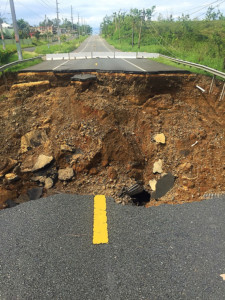
Typical road damage even two months after the hurricane
Because there is no electricity, there are no working traffic lights.
“They have seven-lane highways like we have here in NJ,” said Bernard, recalling his team’s other major assignment, traffic control. “The cars are meeting at intersections with no lights. It’s a free for all. We saw accidents everywhere. Cars were on the side of the road because they ran out of fuel or because they were disabled or struck and couldn’t get a tow truck. Or, people would pull over because at various points on the highway, there was cellphone service, little pockets of service where people would gather to use their phones.
“We were relieving the local police officers from traffic posts so they could actually go into the town and answer calls. It was a huge help for them. Again, they’d had no days off. The posts needed to be manned because the traffic was absolutely gridlocked. I’ve never seen traffic like that before. Even the shoulders were being used.”
Officer Bernard’s lasting memories from the 14-day trip linger on the great spirit of the people he met everywhere.
“They would come up to us and say ‘thank you’. What I found, which will stick with me forever, was that a lot of people were so optimistic. They were going home to no power, no anything. They would see us and say thank you for being here, thank you for helping us. We would see people who just finished waiting in line for two hours to get water and food drive up to us and offer us water. They’d say thank you, can I give you water?”
Caguas has become a symbol of the resilience of Puerto Rico during this trying time. And no one personifies that resilience more than Ralffy Díaz Reyes, a Caguas police officer who lost a leg in a boating accident 20 years ago. He got permission to return to duty in 2009, even with only one leg, and can be seen regularly directing traffic on one leg and crutches.
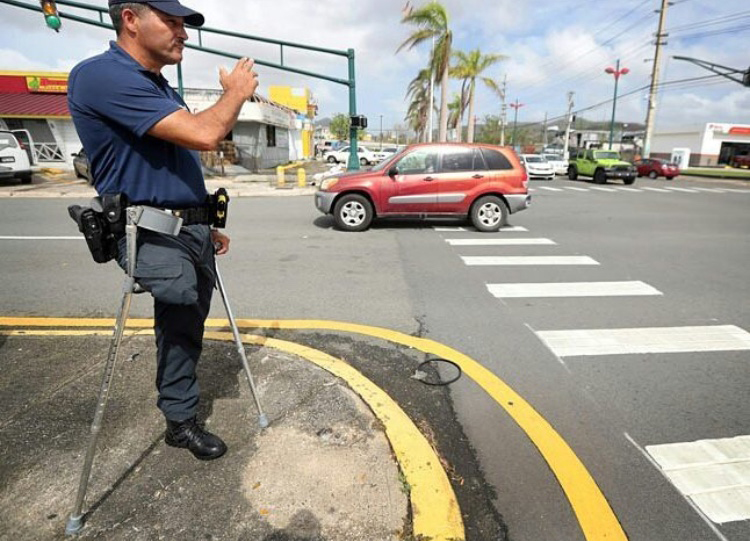
Officer Ralffy Diaz Reyes at a traffic post
“He was out there directing traffic in the heat, blowing his whistle with one leg,” said Bernard. “And I shook his hand. It was unbelievable.”
Bernard was effusive in his praise for the New Jersey State Police, who organized the trip in the face of tremendous logistical challenges.
“I give so much credit to the state police, the way they were able to put together 24 police agencies to work together. They were able to be self-sufficient, getting vehicles there, food water, housing. The way they ran the operation was absolutely amazing.
“The police officers I was with, it didn’t matter how long the work day was, it was what else can I do? What else can I help you with? It was such a great feeling to be a part of that team.”
Bernard’s parents are from Puerto Rico and he has aunts, uncles and cousins on the island. He was able to visit some of them briefly during the trip.
“They’re exhausted,” he said.
“I couldn’t be prouder of Elliott,” said Fanwood Police Chief Richard Trigo. “He did great work down there and represented us in the best possible way. I appreciate our Mayor, Colleen Mahr, giving us the green light.”
“This was an easy decision,” said Mayor Mahr. “The Borough Council and I are proud that Elliott represented us in supporting Puerto Rico’s recovery.”

